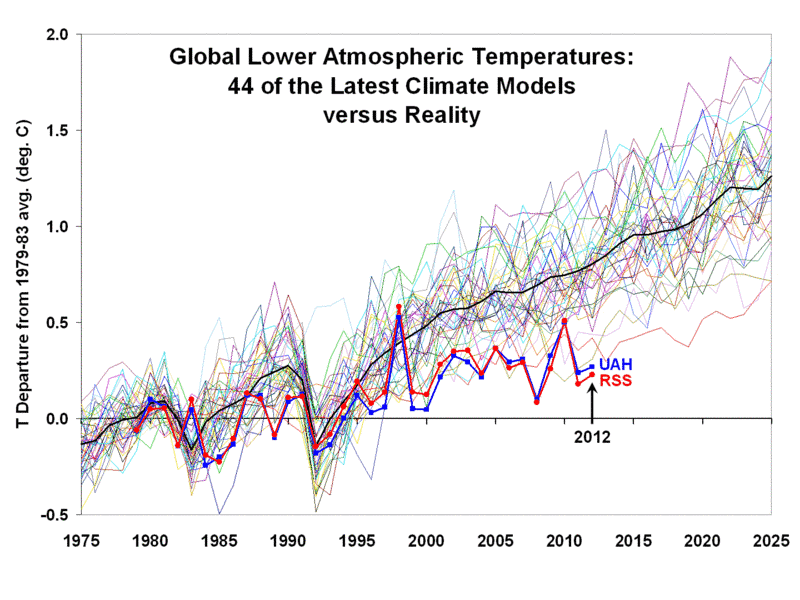PIK scientist Stefan Rahmstorf at Twitter directs our attention to an interview he gave on German Public Radio.
The interview is about new models that predict the frequency of heat waves globally will double in the next seven years alone, i.e. by 2020, and quadruple again by 2040. I wrote about this yesterday here.
In the interview Rahmstorf says “the probability of experiencing extreme weather events multiplied over the last decades, simply as a consequence of global warming.” Rahmstorf then explains how models have discovered this:
Colleagues looked: Today’s climate models can well reproduce this trend of increasing heat extremes in the past. And as you have confirmed, they used these models to look into the future and have determined that these heat extremes will double by the year 2020 and then once again quadruple in frequency by the year 2050.”
Here Rahmstorf claims that if a model is able to reproduce the past, then it can reproduce the future. Just forget that any model can be made to reproduce the past and then project any future you so desire. Rahmstorf is sounding more and more like a swindler selling phony fortune-telling services with each passing interview. And above I understand from his words a frequency increase of 8 times.
German Public Radio moderator Fecke then asked what exactly makes the projections so robust? Rahmstorf:
Robust is that we use the measured data of the last 130 years and look at how well the newest generation of climate models, that is the complete range that we have from the various research groups from the whole world, can reproduce the past. And it has been determined that they can do this very well, and for this reason we are confident that the results are also robust for the future development.”
Good hindsight automatically means good foresight?
How good were the “old” models? Here’s what the IPCC told us late last year:
Not very good at all. Worse, Hans von Storch and his colleagues just assessed the performance of the climate models. Here’s the result:
…for the 15-year trend interval corresponding to the latest observation period 1998-2012 , only 2% of the 62 CMIP5 and less than 1% of the 189 CMIP3trend computations are as low as or lower than the observed trend.”
That’s Epic failure.
But I guess these were just the “old models”. Rahmstorf is now talking about a “new generation” of super-tuned models, which are now more robust than ever.
But does it really matter how new or how old the models are? The only fact that matters is that temperatures haven’t risen at all in 15 years, and if that trend continues, then Rahmtorf’s much ballyhooed new generation of robust models are going to be just as wrong. Heat waves aren’t going to quadruple should temperatures remain stagnant or fall.
Finally, it’s worth noting that Rahmstorf, and the likes of him, have quit talking about the global mean temperature. Instead they are using a new yardstick for measuring global warming: the undefined vague frequency of weather events. No alarmist wants to talk about the global mean temperature anymore.






“And it has been determined that they can do this very well, and for this reason we are confident ”
He basically says that they have f0r the first time ever done validation runs; and the fawning lickspittle from the state broadcaster of course laps it up.
This is such a dishonorable republic of liars and cronies.
The boy who cried wolf finally found and old picture of a wolf and he really knows what one looks like. He plans to see one in the future.
Really, I mean it this time. Honest. I promise.
BTW a question that the state broadcaster employee of course hasn’t asked but that must be asked. WHAT temperature series in which version has Rahmstorf used for the validation? And is he aware of the fact that after the next regular history rewriting in the GISS and HadCRAP4 temperature series the validation will be off again? Only a rethorical question, as I am sure that rahmstorf can present any result he wants, as long as the Cause requires it; and the alleged validation is only a lie anyway.
Would von Storch agree?
In the patent game, when considering cases that are a bit…um…ambitious, there are some who are known to ask:
“Are you patenting an invention or inventing a patent?”
I guess I might ask Rahmstorf:
“Are you validating a model or modeling a validation?”
German MP Frank Schaeffler (FDP), well known Euro (currency) sceptic, openly critizises climate change “ideology” !
http://www.wallstreet-online.de/nachricht/6302591-meinung-marktwirtschaftliche-energiepolitik-jetzt
Astonishing; as an FDP member is currently the boss of GLOBE Germany; the organisation that coordinates the renewable energy policies of all parties of all countries in EU/US/Japan.
Maybe Schaeffler is just a front to attract skeptic voices. He does not mention GLOBE.
Correction: GLOBE Germany is the German subsidiary of GLOBE international; coordinating the work of the Bundestag members towards the renewable energy solution.
All documented on
http://www.globeinternational.org/
Oh, Mr. Rahmstorf, do you know what curve-fitting is?
This clown is very far away from understanding the basics of modeling.
[…] https://notrickszone.com/2013/08/16/rahmstorf-claims-new-generation-of-climate-models-are-robust-beca… […]
Your models can match the past, great! Give us a time span (say 10 or 15 years) that they will be useful for and a performance tolerance to how close they will be to actual temperature measurements. Also provide which temperature record they will be measured to, GISS, RSS, UAH etc and name any internal variables that the models will not be considering like volcanoes, TSI, and ENSO.
We will talk again in 10-15 years and see how you have done. If your models have met the standard that you set then we will have something that is useful for climate forecasting.